Unter der Schirmherrschaft von
Frau Senatorin Karen Pein
Senatorin für Stadtentwicklung und Wohnen der Freien und Hansestadt Hamburg
lobt die Professur für
Digitales Integriertes Prozessmanagement – Planen (Building Information Modeling – BIM)
an der HafenCity Universität Hamburg,
in Zusammenarbeit mit der
EUROPA-CENTER Uwe Heinrich Suhr Stiftung,
zum 3. Mal den
„EUROPA-CENTER Suhr BIM Preis“ aus.
Themenschwerpunkt in diesem Jahr:
Konzepte für die Durchführung von BIM-Anwendungsfällen im Lebenszyklus von Bauwerken mit Fokus auf die Interoperabilität von Modelldaten für externe, nicht IFC-basierte Prozesse
Building Information Modeling basiert auf der integrierten Zusammenarbeit diverser Akteure, die mit unterschiedlichen Werkzeugen Bauwerke jeder Art kollaborativ planen und gestalten. Interoperabilität ist dabei eine Voraussetzung, wenn diese Kollaboration über die Grenzen von Software-Ökosystemen hinaus erfolgen soll. Dabei ist die Nutzung von offenen Standards (open-BIM) aus unserer Sicht unabdingbar. Die Nutzung proprietärer Werkzeuge und Formate wird durch eine zunehmend dynamische Open-Source-Szene in Fachkreisen immer mehr ergänzt. Es können also auch Arbeiten eingereicht werden, die nicht nur auf proprietäre Werkzeuge zurückgreifen, sondern auch Open-Source-Tools einsetzen.
Darüber hinaus sollte das Informationsmanagement mit BIM nicht mehr nur in Abhängigkeit eines geometrischen Kontextes gesehen werden. Informationsbedarfe im Lebenszyklus von Bauwerken sollten vielmehr so aufbereitet werden, das unterschiedliche Informationsabfragen mit unterschiedlichen Prozessen verknüpft werden können (linked data). Dies kann über verschiedene Formen von Datenbanken oder Schnittstellen erfolgen und erlaubt damit eine Bearbeitung der mit einem Modell verknüpften Daten unabhängig von üblichen BIM-Programmen. Gleichzeitig ermöglicht es einen wesentlich differenzierteren Ansatz des Datenmanagements und erlaubt die Einbindung von Akteuren, die bisher kaum in das Datenmanagement mittels “klassischem” BIM involviert werden konnten.
Vor diesem Hintergrund richtet sich der EUROPA-CENTER Suhr BIM-Preis dieses Jahr speziell an hervorragende Studienarbeiten, die sich auf die Verbindung von BIM mit externen Prozessen fokussieren.
Es können auch Arbeiten mit einem anderen Themenfokus im Bereich BIM eingereicht werden!
Folgende Aspekte können thematisiert werden (Themenvorschläge – nicht zwingend einzuhalten):
- Digitale Gebäudemodelle für externe Prozesse
- Anbindung und Nutzung von externen Datenbanken zum Informationsmanagement, Datenstreaming aus dem/in das Modell
- Linked Data
- Export/Import von Daten in/aus dem Modell in andere Formate
- Zugriff und/oder Bearbeitung der BIM-Daten ohne klassische Autorenprogramme.
- BIM und KI
- KI-basierte Auswertungen von Gebäudeinformationsmodellen (z.B. für LCA, Kosten, Circularity)
- Nutzung von KI zur Entwicklung von Modellen über existierende oder selbst entwickelte Programme/Algorithmen (z.B. für Entwurf, Parametrik, Analyse)
1. Über die Professur:
Die Suhr-Stiftungsprofessur für Digitales Integriertes Prozessmanagement fokussiert sich auf die wissenschaftliche Auseinandersetzung mit digitalen Planungswerkzeugen und dem Informationsmanagement in Planung, Bauen und Betrieb von Bauwerken. Dabei spielt die Betrachtung von Prozessen und Abläufen im interdisziplinären Kontext eine wichtige Rolle und der mit der Digitalisierung einhergehende Wandel der Berufsbilder. Von zentraler Bedeutung ist hierbei die praxisbezogene Vermittlung der kooperativen Arbeitsmethodik des Building Information Modeling (BIM) in Forschung und Lehre.
2. Teilnahmebedingungen:
- Berücksichtigt werden Abschlussarbeiten, die in deutscher oder englischer Sprache verfasst und nicht älter als 2 Jahre sind (Abgabe- bzw. Verteidigungsdatum ab Wintersemester 22-23)
- Teilnehmerberechtigt sind Bachelor- bzw. Master-Studierende europäischer Hochschulen der Fachbereiche Architektur, Bauingenieurwesen, Stadtplanung oder verwandter Disziplinen
3. Einzureichende Unterlagen
- Exposé (max. 3 DIN A4-Seiten, einseitig bedruckt), in welchem die Qualifizierung der Thesis gemäß Auslobungskriterien dargestellt wird (EN/DE)
- die vollständige Thesis (EN/DE), inkl. Notennachweis (falls vorhanden)
- Kontaktdaten
4. Einreichung:
Bitte reichen Sie Ihren Wettbewerbsbeitrag als .zip-Archiv mit folgendem Titel: „BIM-Preis_2024_Nachname_Titel der Arbeit_MA (oder BA)“ über die HCU-Cloud ein: https://cloud.hcu-hamburg.de/nextcloud/s/pSftM9YApJsrft8
5. Preise
Es werden jeweils 3 Preise in den Kategorien „Masterthesis“ und „Bachelorthesis“ mit folgenden Preissummen vergeben:
Master: Bachelor:
1. Preis 3.000 € 1. Preis 2.000 €
2. Preis 2.000 € 2. Preis 1.250 €
3. Preis 1.000 € 3. Preis 750 €
6. Jury-Mitglieder:
Die Jury besteht aus 5 Experten aus Wirtschaft, Verbänden, öffentlicher Hand, Forschung und den auslobenden Institutionen. Die Mitglieder werden zeitnah bekanntgegeben.
7. Termine
- Ausschreibung: Juli 2024
- Abgabe der Beiträge bis 27.09.2024
- Jury-Sitzung Oktober 2024
- Preisverleihung November / Dezember 2024
8. Bewertungskriterien:
- Innovativer Ansatz der Arbeit im Zusammenhang mit dem diesjährigen Themenschwerpunkt
- Wissenschaftskompetenz und Potential für weiteres Forschungsvorhaben
- Methodologischer Ansatz und Tiefe der Ausarbeitung
- Berücksichtigung der Verknüpfung einzelner Arbeitsprozesse auf der Grundlage von BIM
- Praxisrelevanz
9. Kontakt für Rückfragen:
Herr David Ehrenreich B.Sc.
Professur für Digitales Integriertes Prozessmanagement – Planen
HafenCity Universität Hamburg
Überseeallee 16, 20457 Hamburg
david.ehrenreich(at)hcu-hamburg.de / Tel.: +49 40 42827 4586
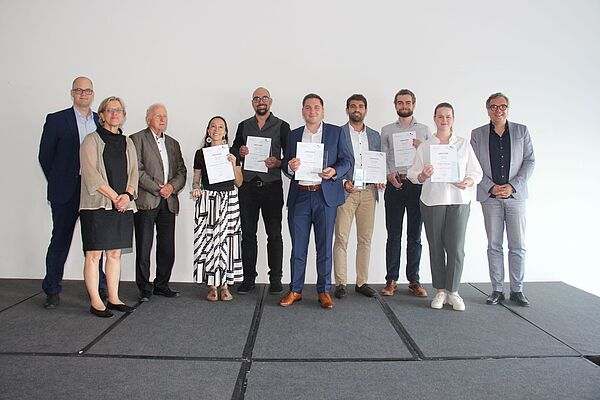
Award Ceremony
Under the patronage of Senator Dr Dorothee Stapelfeldt (Ministry of Urban Development and Housing, BSW), the award ceremony took place on Wednesday, 13 July 2022, in the Holcim Auditorium of the HCU. The BIM Prize was awarded in the presence of State Councillor Monika Thomas (BSW), HCU President Prof Dr Jörg Müller-Lietzkow and Prof Daniel Mondino (BIM).
Background and Focus
The prize was awarded to thesis that deal with the application of BIM methodology in connection with sustainability aspects and with a focus on building in existing buildings. The professorship for "Digital Integrated Process Management - Planning Building Information Modelling (BIM)" at the HCU awards the prize in cooperation with the EUROPA-CENTER Uwe Heinrich Suhr Foundation.
Prize Winners
Bachelor
-
- 1st Place: Prozessentwicklung und Formulierung einer Handlungsempfehlung für eine modellbasierte Ökobilanzierung, Celine Herzog, Civil engineering, TU Dortmund
- 2nd Place: Verbindung von sensorisch erfassten Daten, IFC-Modellen und einer Datenbank zur ökologischen Optimierung von Bestandsgebäuden, Dennis Witte, Civil engineering, HafenCity University Hamburg
- 3rd Place: BIM-based information management of the built environment for solar effect and interaction assessment, Lukas Boy & David Ehrenreich, Urban planning, HafenCity University Hamburg
Master
-
- 1st Place: Urban Assessment In Grasbrook District Master Plan With CityScope Digital Tool, Mete Boncukcu, Resource Efficiency in Architecture and Planning (REAP), HafenCity University Hamburg
- 2nd Place: BIM-Integration of Sustainable Building Certification Criteria in the Early Design Stages, Lena Drewes, Energy-efficient and sustainable construction, TU Munich
- 3rd PLace: Erzeugung von synthetischen Datasets für die semantische Segmentierung von Punktwolken, Margarita Schick, Civil engineering, TU Kaiserslautern
- Honorable mention: BIM as a Tool for Sustainable Material Decision-making, Maria Camila Afanador Salas, Resource Efficiency in Architecture and Planning (REAP), HafenCity University Hamburg
EUROPA-CENTER Suhr BIM Prize
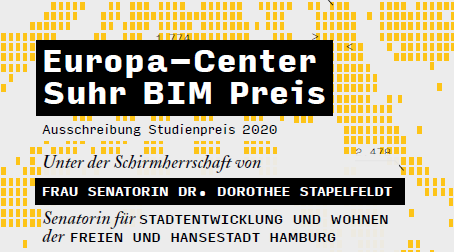
Under the patronage of
Senator Dr Dorothee Stapelfeld,
Senator for Urban Development and Housing of the Free and Hanseatic City of Hamburg,
honours the professorship for
„Digital Integrated Process Management - Planning
Building Information Modeling (BIM)“
at the HafenCity University Hamburg,
in cooperation with the EUROPA-CENTER Uwe Heinrich Suhr Foundation,
is awarding the „EUROPA-CENTER Suhr BIM Prize“ for the second time this year.
The prize is awarded to Bachelor's or Master's theses in the field of BIM that deal with the following topic:
"Resource efficiency and sustainability with Building Information Modelling (BIM), with particular focus on existing buildings"
Building Information Modelling enables consistent information management across the entire life cycle of a building on the basis of digital building models. In view of the challenges we face today in terms of sustainability and environmental protection, these aspects must also be taken into account in the planning, construction and operation of buildings.
This is increasingly being done on the basis of the BIM method, but primarily with a focus on new construction. In the case of existing projects, aspects of sustainability are still not dealt with enough and certainly not on the basis of digital, model-based processes. This also applies to the interactions between existing and new buildings at neighbourhood level and the associated effects.
With this in mind, this year's EUROPA-CENTER Suhr BIM Prize is specifically aimed at outstanding student research projects that use the BIM method to address sustainability issues for maintenance, remodelling or operation of buildings.
The following aspects can be addressed:
- Inventory recording and data transfer to digital building information models,
- Sustainability aspects, such as CO2 neutrality, resource efficiency, waste avoidance, etc.
- Integration of material properties in specialised and sub-models
- LCA-oriented modelling / integration of LCA values (Life-Cycle Assessment),
- Integration of real-time data into the model (use of sensor technology),
- Monument protection,
- Fire protection planning in existing buildings,
- Integration into a CAFM system (BIM2FM),
- Interaction between existing and new buildings
The endowed professorship for Digital Integrated Process Management focuses on the scientific examination of digital planning tools at the interface to practice: planning - construction - operation - overall coordination - data management. The consideration of processes and procedures in an interdisciplinary context plays an important role here, as does the change in job profiles associated with digitalisation.
Of central importance here is the practical teaching of the cooperative working methodology of Building Information Modelling (BIM) in research and teaching.
In this context, BIM is understood in accordance with the definition from the "Digital Planning and Construction" step-by-step plan of the Federal Ministry of Transport and Digital Infrastructure from December 2015:
„Building Information Modelling refers to a cooperative working methodology that uses digital models of a building to consistently record and manage the information and data relevant to its life cycle and exchange it in transparent communication between the parties involved or hand it over for further processing.“
Conditions of participation
Theses written in German or English and not older than 1 year (winter semester 2019/2020 at the latest with submission or defense date no earlier than 01.01.2020) are eligible for participation Bachelor's or Master's students from European universities who are studying architecture, civil engineering, urban planning, urban planning, geodesy and other related disciplines with a focus on the planning and design of the built environment.
Documents to be submitted
-
Exposé (max. 3 DIN A4 pages, printed on one side), in which the qualification of the thesis is presented according to the award criteria (de/en)
-
the complete thesis (de/en), including proof of grades (if available)
-
Contact details
All documents must be submitted in electronic form only.
Three prizes will be awarded in each of the two prize categories "Master's thesis" and "Bachelor's thesis".
Prizes
The prize money is distributed as follows:
Master
1st Prize eur 3000
2nd Prize eur 2000
3rd Prize eur 1000
Bachelor
1st Prize eur 2000
2nd Prize eur 1250
3rd Prize eur 750
Jury members
The jury consists of 5 experts from business, associations, the public sector, research and the awarding institutions. The members will be announced shortly
Submission
Please submit your competition entry exclusively by e-mail to BIM@hcu-hamburg.de with the subject: „BIM-Prize 2020: [Titel of thesis, MA or BA]“.
For attachments larger than 8 MB, submission via the HCU cloud is recommended:
>> Upload-Link: https://cloud.hcu-hamburg.de/nextcloud/index.php/s/r3nytbJmR3xoGAM
Call dates
Call for submissions 25 November 2020
Submission of the contributions 15 March 2021
Jury meeting End of March 2021
Decision End of March 2021
Award ceremony Mid of April 2021
Contact
Emiliya Popova
Research Associate
Professorship for Digital Integrated Process Management - Planning
HafenCity University Hamburg
University for Architecture and Metropolitan Development
Henning-Voscherau-Platz 1
20457 Hamburg
BIM(at)hcu-hamburg.de
Tel.: +49 40 42827 5236
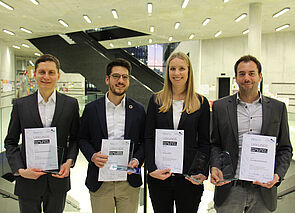
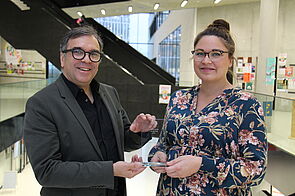
Prizes were awarded to Bachelor's and Master's theses in the field of BIM (Building Information Modelling) that demonstrate the cooperative aspect of collaboration with BIM or the linking of individual work processes based on digital building data models. The prize winners include two HCU students from the Civil Engineering programme.
Bachelor's and Master's graduates from six universities in Germany, mainly specialising in civil engineering, applied for the prize. The works cover a very broad thematic spectrum: from specific issues in the application of BIM methodology in building construction and civil engineering projects to solutions for process automation and optimisation for life cycle assessments of buildings, through to business informatics approaches for the development of "business ecosystems" in architecture.
In order to recognise the diversity and quality of the contributions made, the jury decided to award two 3rd prizes and adjust the prize amounts accordingly:
1st Prize (2500 Euro): Verena Wolf, Civil Engineering, Technical University of Munich:
"Entwicklung eines Konzeptes zur Bewertung digitaler Datenmodelle am Beispiel einer Bahnsteigplanung"
Supervisors: Prof. Dr.-Ing. André Borrmann and Štefan Jaud, M.Sc.
2nd Prize (1500 Euro): Kasimir Forth, Energy-efficient and sustainable construction, Technical University of Munich: "BIM-integrierte Ökobilanzierung"
Supervisors: Prof. Dr.-Ing. André Borrmann and Alexander Braun, M.Sc.
3rd Prize (1000 Euro): Sina Petersen, Civil Engineering, HCU Hamburg:
"Vergleich der konventionellen Entwurfsplanung und der Anwendung BIM-gestützter Methoden am Beispiel einer Autobahnüberführung mit Verbundquerschnitt"
Supervisors: Prof. Dr.-Ing. Annette Bögle and Dipl.-Ing. Jörg Seifried
3rd Prize (1000 Euro): Anton Kanstantsinau, Civil Engineering, Konstanz University of Applied Sciences Technology, Business and Design (HTWG):
"BIM im Membranbau. Konzipierung einer effizienten BIM-Kette für den Membranbau"
Supervisors: Prof Oliver Fritz and Dr André Ihde
Special mention from the jury: Simon Tabarelli, Civil Engineering, HCU Hamburg:
"Nichtlineare Optimierung im Bauingenieurwesen. Entwicklung der n-1-dimensionalen Gruppierung als Methode zur Visualisierung von mehrdimensionalen Daten"
Supervisors: Prof. Dr.-Ing. Annette Bögle and Kai Schramme, M. Sc.
The jury consisted of five experts from business, the public sector and research: Prof. Dipl. Arch. ETH SIA BDA Daniel Mondino (Digital Integrated Process Management - Planning (Building Information Modelling), HCU Hamburg), Prof. Dr.-Ing. Annette Bögle (Design and Analysis of Structures, HCU Hamburg), Prof. Dr. rer. nat. Dr.-Ing. habil. Klaus-Uwe Fehlauer (Professor of CAD, Construction Informatics, Mathematics and CAFM, Wismar University of Applied Sciences and Head of the Research Institute for Applied Informatics in Construction (IAIB e.V.)), Andreas Jantzen (Overall Project Management, Project Management Planning and Construction and BIM Management, EUROPA-CENTER AG) and Felix Scholz (Head of PMO & Digitalisation - Technical Division Engineering & Construction, Hamburg Port Authority).
EUROPA-CENTER Suhr BIM Prize
The professorship for
„Digital Integrated Process Management - Planning
Building Information Modeling (BIM)“
at the HafenCity University Hamburg,
in co-operation with the EUROPA-CENTER Uwe Heinrich Suhr Foundation,
is awarding the „EUROPA-CENTER Suhr BIM Prizes“ for the first time this year.
The prize is awarded to Bachelor's or Master's thesis in the field of BIM that
"Demonstrate the cooperative aspect of collaboration with BIM or the linking of individual work processes on the basis of digital building data models"
The endowed professorship for Digital Integrated Process Management focusses on the scientific examination of digital planning tools at the interface to practice: planning - construction - operation - overall coordination - data management.
interface to practice: planning - construction - operation - overall coordination - data management. The consideration of processes and procedures in an interdisciplinary context plays an important role here, as does the change in job profiles associated with digitalisation.
Of central importance here is the practical teaching of the cooperative working methodology of Building Information Modelling (BIM) in research and teaching.
In this context, BIM is understood in accordance with the definition from the "Digital Planning and Construction" step-by-step plan of the Federal Ministry of Transport and Digital Infrastructure from December 2015:
„Building Information Modelling refers to a cooperative working methodology that uses digital models of a building to consistently record and manage the information and data relevant to its life cycle and exchange it in transparent communication between the parties involved or hand it over for further processing.“
With this in mind, this year's EUROPA-CENTER Suhr BIM Prize is specifically aimed at outstanding student research projects that use the BIM method to address issues of cooperation, collaboration and linkage.
Conditions of participation
Thesis written in German or English and not older than 1 year (no later than winter semester 2018/2019 with submission or defense date no earlier than 01.01.2019) will be considered. Bachelor's and Master's students from European universities who are studying architecture, civil engineering, urban design, urban planning, geodesy and other related disciplines focussing on the planning and design of the built environment are eligible to participate.
Documents to be submitted
-
Exposé (max. 3 DIN A4 pages, printed on one side), in which the qualification of the thesis is presented according to the award criteria (de/en)
-
The complete thesis (de/en), including proof of grades (if available)
-
Contact details
All documents must be submitted in electronic form only.
3 prizes will be awarded.
Prizes
The prizes are distributed as follows:
1st Prize eur 3000
2nd Prize eur 2000
3rd Prize eur 1000
Jury members
The jury consists of 5 experts from business, associations, the public sector, research and the awarding institutions. The members will be announced shortly
Submission
Please submit your competition entry exclusively by email to BIM@hcu-hamburg.de with the subject line: „BIM-Preis 2019: [Title of Thesis, MA oder BA]“ .
Dates
Call for entries 10 July 2019
Submission of entries 01 September 2019
Jury meeting Mid September 2019
Decision End of September 2019
Award ceremony start of October 2019
Contact
Emiliya Popova
Research Associate
Professorship for Digital Integrated Process Management - Planning
HafenCity University Hamburg
University for Architecture and Metropolitan Development
Henning-Voscherau-Platz 1
20457 Hamburg
BIM(at)hcu-hamburg.de
Tel.: +49 40 42827 5236
EVENT - 21 - 22 FEBRUARY 2019
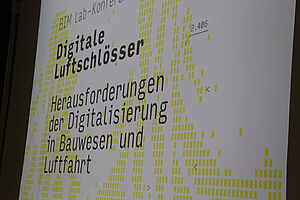
The BIMLab@HCU and the German Aerospace Center (DLR) are organising a joint series of events entitled "Digital Castles in the Air", which kicked off on 21 and 22 February 2019 at HafenCity University Hamburg. In four thematic sessions, the conference showed which "Technologies" are available, how "Processes" are changing, what this means for the training of "People" and which "Boundary conditions" are required for digital change. The organisers were Björn Nagel (DLR), Prof. Dr.-Ing. Annette Bögle and Prof. Daniel Mondino (both HCU Hamburg), who also moderated the event.
Digitalisation in the planning and construction of buildings is changing not only the way in which projects will be processed and information exchanged in the future, but also the content of the individual professions. Co-operative, integrated processes and the use of new technologies require architects and engineers to have extended skills and knowledge, which must be taught in training. Optimisation processes are also being driven forward in the aviation industry using digital tools. The BIMLab@HCU intends to investigate the associated challenges in the research collaboration with the German Aerospace Centre, which is just beginning.
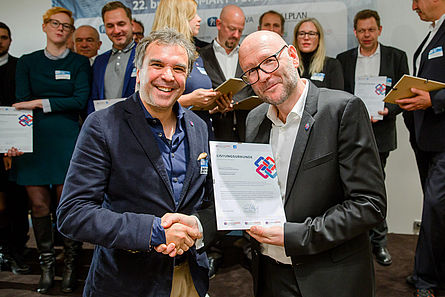
The basic course on Building Information Modelling (BIM) at HafenCity University Hamburg (HCU Hamburg) has been certified in accordance with the standards jointly defined by buildingSMART and the Association of German Engineers (VDI). In future, students at HCU Hamburg will be able to take the examination in accordance with buildingSMART's "Learning Outcome Framework" and receive a certificate of basic knowledge in the digital construction, planning and operation of buildings. With this certification, HCU Hamburg guarantees compliance with learning objectives and the teaching of course content in its BIM basic courses in accordance with the quality criteria and requirements of buildingSMART and VDI.
The certificate for training in BIM awarded by buildingSMART and VDI to further education institutions adopts the specifications of buildingSMART International. By being listed as a training institution for BIM, HCU Hamburg enables its students to acquire a qualification in Building Information Modelling in accordance with international standards. Certified institutions undertake to use the buildingSMART International online final examination. This year, buildingSMART and VDI have certified 14 further education institutions throughout Germany as qualified BIM trainers for the first time. The listed institutions are authorised to issue the "buildingSMART/VDI Certificate BIM Qualifications - Basic Knowledge" to their course participants in future.
Prof. Daniel Mondino, Chair of Digital Integrated Process Management - Planning, Building Information Modelling (BIM), HCU Hamburg: "For HCU Hamburg, the listing is an important milestone in the development of our BIM expertise. With the courses, we not only want to provide our students with the necessary basic knowledge in the field of Building Information Modelling, but also offer external interested parties courses that they can complete with a certificate."
Background:
The BIMLab@HCU was officially opened in July 2018. The new teaching and research laboratory for BIM develops a wide range of topics on digitally integrated processes and new perspectives as well as practical possibilities for the construction, planning and operation of buildings. BIM refers to a cooperative, model-based planning methodology and utilises digital processes and strategies. The BIMLab@HCU is headed by civil engineering professor Dr Annette Bögle, architecture professor Dipl.-Ing. Reinhold Johrendt and architect Prof Daniel Mondino (endowed professorship of the EUROPA-CENTER Uwe Heinrich Suhr Foundation). In future, the BIMLab@HCU will serve the Hamburg metropolitan region as a laboratory for the application of BIM and as a platform for the further development of the method.
Contact HafenCity University Hamburg (HCU Hamburg):
Prof Daniel Mondino, Digital Integrated Process Management (BIM) +49 (0)40/428 27-4065 daniel.mondino(at)hcu-hamburg.de
EVENT - 9 JULY 2018
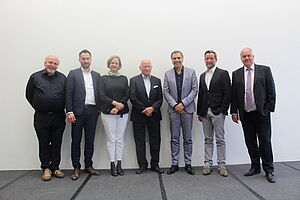
The interdisciplinary BIMLab@HCU will research and test how digitalisation can be used in the planning, construction and operation of buildings using Building Information Modelling (BIM) as a laboratory for the Hamburg metropolitan region in future
On 9 July 2018, HafenCity University Hamburg (HCU Hamburg) held the launch event for the Building Innovation Lab (BIMLab@HCU) in the Holcim Auditorium in front of around 100 guests and interested parties from architecture and engineering firms and Hamburg authorities, as well as numerous lecturers and students. In the new teaching and research laboratory for BIM - Building Information Modelling - a wide range of topics on digitally integrated processes and new perspectives as well as practical possibilities are to be developed. BIM refers to a cooperative, model-based planning methodology and utilises digital processes and strategies for the planning, construction and operation of buildings. The BIMLab@HCU is headed by civil engineering professor Dr Annette Bögle, architecture professor Dipl.-Ing. Reinhold Johrendt and architect Prof Daniel Mondino. In future, the lab will serve the Hamburg metropolitan region as a laboratory for the application of BIM and as a platform for the further development of the method.
The digitalisation of everyday life is making great strides, and the digital transformation is also changing the planning, construction and operation of buildings. BIM as digitally integrated process management for the planning, execution and management of buildings, also known as "Building Data Modelling", is essential in this context. With its interdisciplinary and transdisciplinary approach, the newly founded BIMLab@HCU provides an ideal environment for Building Information Modelling as a cross-sectional discipline at HCU Hamburg. The cooperative working methodology for the digital management of information and data from buildings is to be further developed at HCU Hamburg in future together with all those involved in planning, construction and operation. The appointment of architect Prof Daniel Mondino to the new endowed professorship for digitally integrated process management will strengthen the academic debate on digital planning tools and interdisciplinary exchange at HCU Hamburg. The professorship was made possible by the EUROPA-CENTER Uwe Heinrich Suhr Foundation.
Dr Walter Pelka, President of HafenCity University Hamburg: "BIM is suitable for mastering the ubiquitous "7 plagues of construction" - starting with the precise and realistic definition of the construction project, through intensive communication and an up-to-date exchange of information, to the management of planning and construction. BIM is a contemporary methodology, a philosophy, a way of looking at things and a basis for action for all those involved in construction. The BIMLab@HCU should become the platform of the North for teaching, research and the intensive exchange of all interested parties."
Uwe Heinrich Suhr, EUROPA-CENTER Uwe Heinrich Suhr Foundation: "As a practitioner who deals with architects, clients and investors on a daily basis, I know how important a verified data basis is for large projects. BIM should be relevant for all clients and helps to find solutions. I hope that Hamburg and HCU Hamburg will play a pioneering role in BIM in the future."
Dr Alexander Rieck, Fraunhofer Institute for Industrial Engineering, Stuttgart and LAVA (Laboratory For Visionary Architecture), Stuttgart: "BIM is essentially a digital link between object-oriented three-dimensional planning and an attribute. This attributisation gives us new possibilities based on ordering processes and production processes. BIM is the main core and the digital link between real and virtual planning. In combination with other digital technologies such as blockchain and A.I., BIM enables planning processes to be designed digitally."
Prof. Daniel Mondino, Chair of Digital Integrated Process Management - Planning, Building Information Modelling (BIM), HCU Hamburg: "We have to be aware that the people we train today will face a completely different digital world at the end of their studies. Our training must respond to this. We see the BIMLab as a hotspot for digitalisation in construction, planning and operation in the Hamburg metropolitan region."
Prof. Dr.-Ing. Annette Bögle, Chair of Design and Analysis of Structures, HCU Hamburg: "We need to communicate across the boundaries of disciplines, as BIM is a cross-sectional discipline. We want to be the associated centre of excellence in the future."
Prof. Dipl.-Ing. Reinhold Johrendt, Chair of Construction Economics, HCU Hamburg: "We are also ideally positioned in basic research on BIM. 75% of our Master's students are already attending one of our BIM seminars. Our students have realised that BIM is a model for the future."
The preparations for setting up the lab took three years. The lab started work in January 2018. The BIM Lab@HCU is set to become a leading centre for researching and developing model-based planning and processing of construction projects in building construction, civil engineering and infrastructure planning. In addition, the digitalisation of construction planning, execution and maintenance will also permanently change job profiles in architecture and civil engineering in the coming years and decades. HCU Hamburg and the BIMLab@HCU want to help shape this development in research and teaching and prepare students and graduates for practice and their future careers in a contemporary and future-oriented manner with regard to the BIM method and the associated qualification opportunities.



